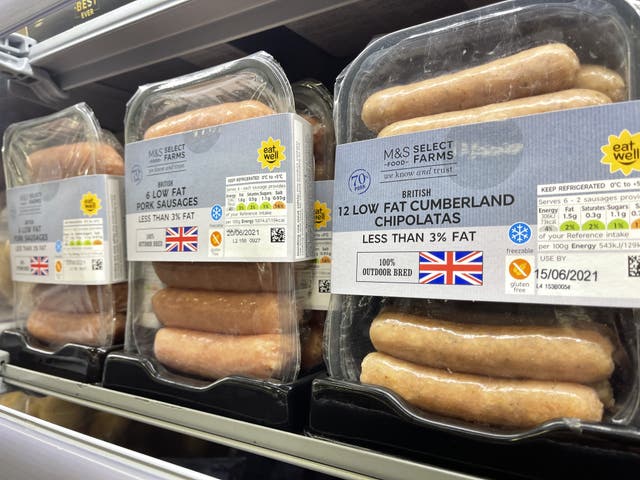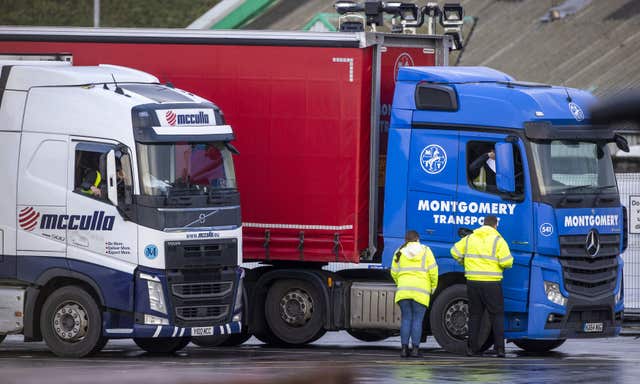
The UK has tabled domestic legislation to unilaterally override the parts of Brexit’s Northern Ireland Protocol that have introduced trade barriers in the Irish Sea. Here is what the Government is planning:
– Green channel for goods staying within the UK
Under the protocol, goods moving from Great Britain to Northern Ireland are subject to additional checks and paperwork regardless of their final destination.
The Government now intends to create green and red channels to differentiate between goods that remain within Northern Ireland and those destined for onward transportation across the Irish border into the EU.
Goods arriving through the green channel would move free of customs or regulatory red tape while the requirements of the protocol would continue to apply to red channel produce.
Goods banned under the protocol, such as certain types of plants and seeds, would be allowed to travel into NI through the green channel, as long as they remained in the region.
Red channel goods shipped to NI would still have to apply EU customs codes and, if relevant, undergo single market agri-food checks.

The Government would verify these customs and regulatory processes, and share the data with the EU.
In order to use the green channel, a business would need to join a UK-established trusted trader scheme (TTS).
All businesses would be eligible for the scheme as long as they provide sufficient information to facilitate monitoring of their operations and supply chains.
HMRC would audit and assess compliance with the TTS and provide that oversight data to the EU in real time.
The legislation will also provide for “robust” penalties, both civil and criminal, for abuse of the green channel provisions.
Some goods deemed higher risk will still be subject to controls regardless of whether they stay in Northern Ireland. That category includes live animals – however that was the case even before Brexit, with the island of Ireland long treated as a single unit on certain biosecurity issues.
The UK proposes the creation of a new biosecurity assurance framework to facilitate EU/UK co-operation on higher-risk goods.
Non-commercial goods such as post and parcels, which require customs paperwork under the protocol, would automatically move through the green channel under the UK plan.
– Dual regulatory framework
Under the protocol, Northern Ireland remains in the EU single market for goods, meaning produce sold in the region must comply with the bloc’s regulations. Any future changes to EU regulations apply in Northern Ireland, but not in the rest of the UK.
The Government is proposing a new framework where goods can be sold in Northern Ireland if they meet either UK rules or EU rules, or both.
Produce due to be moved onward to the EU single market would still need to comply with relevant European standards.
However, the Government wants to ensure that products made to comply with UK standards can be sold in Northern Ireland, even if they are not in line with EU rules.
Under the plan, goods made in NI could be sold freely in the rest of the UK, regardless of whether they apply EU or British standards.

– Changes to tax and spending rules
Under the protocol, Northern Ireland is treated differently to the rest of the UK in respect of certain state aid and VAT rules.
That means that Government subsidies paid out in Northern Ireland must be within limits set by the EU.
While Northern Ireland remains part of the UK’s VAT and excise territory, policies in the region must comply with EU single market rules on goods.
That means Government VAT and excise changes in the rest of the UK do not necessarily apply to NI.
One recent example saw Northern Ireland residents unable to avail of a scheme announced by the Chancellor offering £300 in VAT relief for solar panel installation.
The Government wants to remove these restraints on tax and spending rules in Northern Ireland.
Both the EU and UK made subsidy control pledges in the wider Brexit trade deal, with the UK’s commitments enshrined in the Subsidy Control Act 2022.
The Government wants Northern Ireland to be covered by that Act, rather than EU rules, so that state aid policies can be developed on a UK-wide basis.
While the Government wants to retain the protocol’s general principles on VAT and excise, it wants to add flexibility to allow it to adapt or disapply rules to ensure Northern Ireland is covered by UK-wide policy changes.
– New governance arrangements
The role of the European Court of Justice (ECJ) in the oversight of the protocol has proved controversial.
The Government claims it is unfair that the final arbiter in any future protocol-related trade dispute would be the ECJ.
The UK wants to change the dispute settlement arrangements, removing the ECJ as the final arbiter and replacing it with an independent international arbitration mechanism.
The Government also wants UK courts to oversee the operation of the protocol regime within Northern Ireland.
It still envisages a reference procedure whereby the ECJ would retain a role for issues specific to EU law.


Comments: Our rules
We want our comments to be a lively and valuable part of our community - a place where readers can debate and engage with the most important local issues. The ability to comment on our stories is a privilege, not a right, however, and that privilege may be withdrawn if it is abused or misused.
Please report any comments that break our rules.
Read the rules here